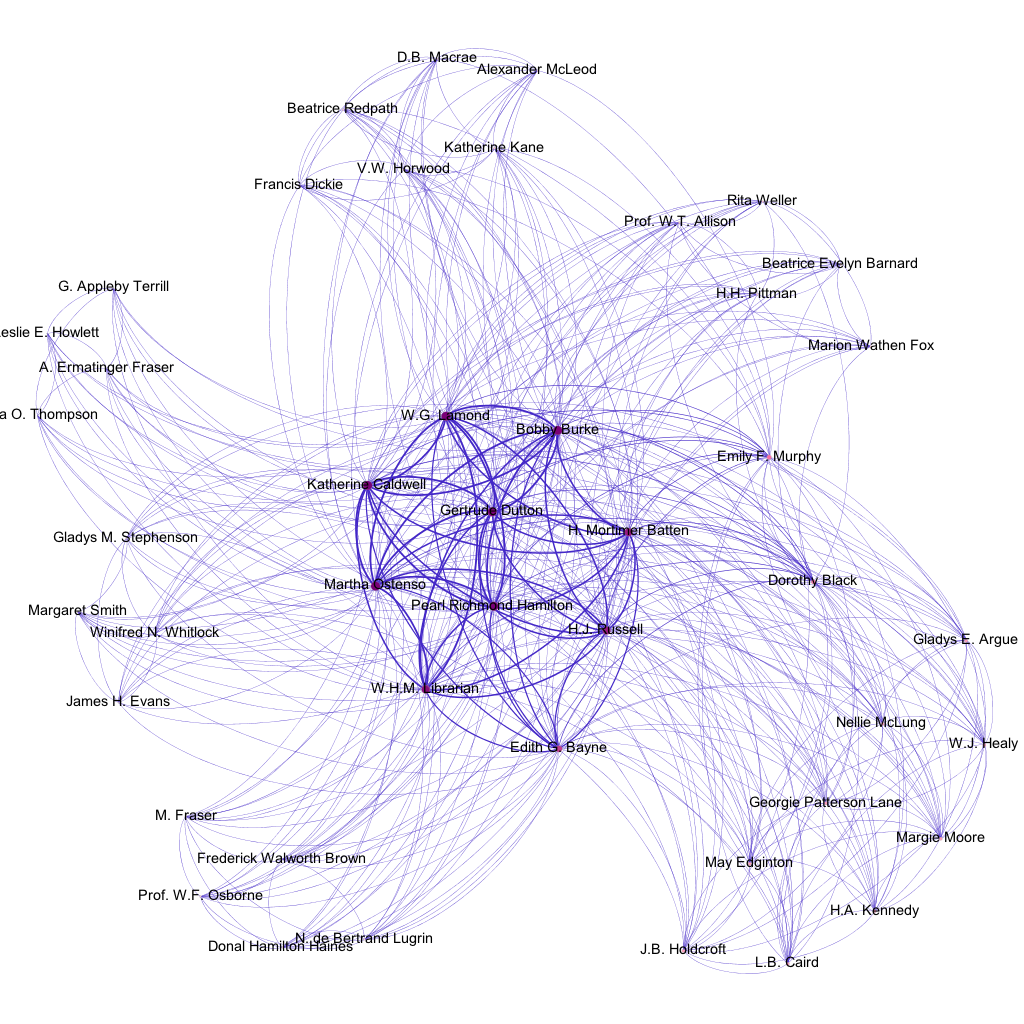Archives
Posts Tagged ‘networks’
May 5, 2014
On Using Tools and Asking Questions
I recently met up with fellow EMiC fellow Nick van Orden, along with a few other colleagues here at the University of Alberta, to discuss our shared experiments in Gephi, “an open graph viz platform” that generates quick and lovely network visualizations. Our meeting was in turn prompted by an earlier off-the-cuff conversation about the pleasures and challenges of exploring new tools, particularly for emerging scholars for whom work that cannot be translated into a line on the CV can often feel like a waste of time. We agreed that spending some time together puzzling over a tool of mutual interest might reduce the time investment and increase the fun factor.
During this first meeting the conversation somewhat inevitably turned to the question of why — why, when there is such a substantial learning curve involved, when it takes SO LONG to format your data, why bother add all? What does a new tool tell me about my object of study that I did not already know, or could not have deduced with old-fashioned analogue methods?
I offer here an excerpt from Nick’s reflection on this conversation, because it is perfect:
DH tools don’t provide answers but do provide different ways of asking questions of the material under examination. I think that we get easily frustrated with the lack of “results” from many of these programs because so much effort goes into preparing the data and getting them to work that we expect an immediate payoff. But, really, the hard intellectual work of thinking up the most useful questions to ask starts once we’re familiar with the program.
The frustration with lack of results, like the frustration with spending time learning something you won’t necessarily be able to use, is based on an instrumentalist approach to academic work that suggests two related things. First, it is, I think, a symptom of the state of the academy in general and humanities in particular. Second, it implies that DH tools should function like other digital tools, intuitively and transparently. I say these points are related because often the instrumentalist approach to scholarship develops into an instrumentalist approach to DH as itself a means for emerging scholars to do exactly the kind of CV-padding that learning a new tool isn’t. And therein lies the value of this “hard intellectual work.”
To illustrate, here is an image of one visualization I produced from Gephi.
This image shows the authors featured in each of the six issues of the magazine Western Home Monthly in which Martha Ostenso’s Wild Geese was serialized between August 1925 and January 1926. It reveals a few things: that there a number of regular feature-writers alongside the shifting cast of fiction and article contributors; that, in terms of authors, different issues thus interweave both sameness and difference; that Ostenso herself briefly constitutes one of those recurring features that characterizes the seriality of the magazine, even if a larger chronological viewpoint would emphasize the difference of these six issues from any others. None of these points are surprising to me; none of them were even, properly speaking, revealed by Gephi. They were, in fact, programmed by me when I generated a GDF file consisting of all the nodes and edges I wanted my network to show.
This image does a much better job of arguing than it does of revealing, because it is based on the implicit argument I formulated in the process of building said GDF file: that a magazine can be understood as a network constituted by various individual items (in this case, authors) that themselves overlap in relationships of repetition and difference. It can thus, as Nick implies, be understood as the result of a series of questions: can a magazine be understood as a network? If so, a network of what? What kinds of relationships interest me? What data is worth recording? What alternate formulations can I imagine, as I better understand what Gephi is capable of?
Work like this is slow, exploratory, and its greatest reward is process rather than product. It may eventually lead to something, like a presentation or a paper, that can show up on a CV, but that is not its purpose. The greatest value of the painstaking work of learning a new tool is this very slowness and resistance to the instrumentalist logics of DH in particular and academic work in general.
What is your experience with learning new tools. What tools have you experimented with? How have you dealt with your frustrations or understood your successes? Do you think of tools as answering questions or helping you to pose better questions? Or as something else entirely?
